Mozambique: Thousands of classes study outdoors, sitting on ground - Minister
Why was Mozambique excluded from the climate summit?
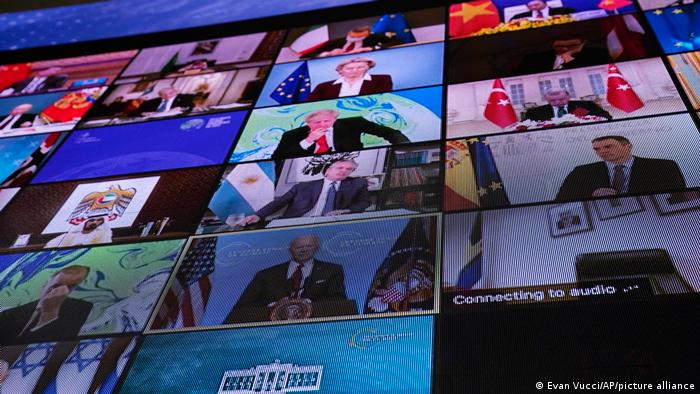
Photo: DW
José Langa, from the Environmental Observatory for Climate Change, is surprised that Mozambique was excluded from the global climate summit hosted by U.S. president Joe Biden. Those most affected should be part of the debate, the environmentalist argues.
More than 40 heads of states and world leaders participate in the Leaders’ Summit on Climate convened by President of the United States, Joe Biden, which started off yesterday (Thursday, 22-04) and ends today.
Environmental activists in several countries accuse the great powers of inaction in reducing the emission of greenhouse gases, at a time when the consequences of climate change are already noticeable in many countries, such as Mozambique.
According to the Global Climate Risk Index, published annually by the non-governmental organization (NGO) GermanWatch, Mozambique ranks first on the list of countries most vulnerable to climate change, after being affected in 2019 (last year analysed) by cyclones Idai and Kenneth, which claimed about 700 lives.
Next Sunday (25-04) marks two years since the passage of Cyclone Kenneth. The country is also currently at risk of being hit by Cyclone Jobo, which would mainly affect the province of Cabo Delgado.
Those most affected should be heard
Langa says it is strange that Mozambique was excluded from the summit.
“It is sad, because it seems that our appeals, the appeals of those who are most affected, do not reach those who have the power. It would have been interesting if we, as the most affected, had been part of this debate,” he says.
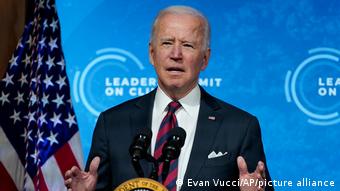
The activist argues that the time has come for the most powerful countries to consider those populations most vulnerable to climate change.
“We are not going to stop asking for help in relation to climate change, for investment in scientific studies that show how much we are suffering, but mainly [recognition of] the neglect of those who cause this issue of climate change,” Langa says.
Union against global warming
On the first day of the event, world leaders called for everyone’s commitment to [reducing] global warming.
UN Secretary-General António Guterres challenged world governments to take climate change seriously. “The world is on red alert. We are on the edge of the abyss. We must be sure that the next step is in the right direction. Leaders everywhere must take action,” Guterres urged.
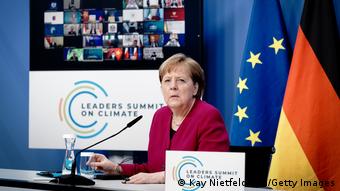
“The signs are unmistakable. The cost of inaction continues to rise,” summit host Joe Biden acknowledged. The U.S. president pledged to cut U.S. greenhouse gas pollution in half by 2030. And he appealed to other world leaders. “Scientists tell us that this is the decisive decade – this is the decade we must make decisions that will avoid the worst consequences of the climate crisis.”
Biden’s new promise came after the Trump administration withdrew from the Paris Climate Agreement. The United States returned to the agreement shortly after President Biden’s inauguration.
German Chancellor Angela Merkel said that her country will continue to play its part in the fight against global warming. “Germany has already reduced its emissions by 40%, compared to 2019, and has said that the EU will be climate neutral by 2050. By 2030, we want to have at least 55% lower emissions, compared to 1990,” Merkel said.
Here’s a look at the world leaders the US invited to the summit.
Prime Minister Gaston Browne, Antigua and Barbuda
President Alberto Fernandez, Argentina
Prime Minister Scott Morrison, Australia
Prime Minister Sheikh Hasina, Bangladesh
Prime Minister Lotay Tshering, Bhutan
President Jair Bolsonaro, Brazil
Prime Minister Justin Trudeau, Canada
President Sebastián Piñera, Chile
President Xi Jinping, People’s Republic of China
President Iván Duque Márquez, Colombia
President Félix Tshisekedi, Democratic Republic of the Congo
Prime Minister Mette Frederiksen, Denmark
President Ursula von der Leyen, European Commission
President Charles Michel, European Council
President Emmanuel Macron, France
President Ali Bongo Ondimba, Gabon
Chancellor Angela Merkel, Germany
Prime Minister Narendra Modi, India
President Joko Widodo, Indonesia
Prime Minister Benjamin Netanyahu, Israel
Prime Minister Mario Draghi, Italy
Prime Minister Andrew Holness, Jamaica
Prime Minister Yoshihide Suga, Japan
President Uhuru Kenyatta, Kenya
President David Kabua, Republic of the Marshall Islands
President Andrés Manuel López Obrador, Mexico
Prime Minister Jacinda Ardern, New Zealand
President Muhammadu Buhari, Nigeria
Prime Minister Erna Solberg, Norway
President Andrzej Duda, Poland
President Moon Jae-in, Republic of Korea
President Vladimir Putin, The Russian Federation
King Salman bin Abdulaziz Al Saud, Kingdom of Saudi Arabia
Prime Minister Lee Hsien Loong, Singapore
President Matamela Cyril Ramaphosa, South Africa
Prime Minister Pedro Sánchez, Spain
President Recep Tayyip Erdoğan, Turkey
President Sheikh Khalifa bin Zayed Al Nahyan, United Arab Emirates
Prime Minister Boris Johnson, United Kingdom
President Nguyễn Phú Trọng, Vietnam


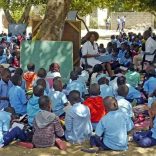


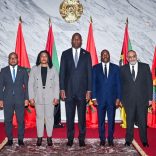
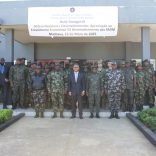
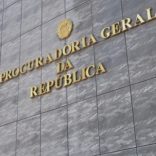





Leave a Reply
Be the First to Comment!
You must be logged in to post a comment.
You must be logged in to post a comment.